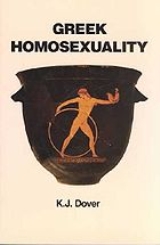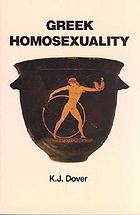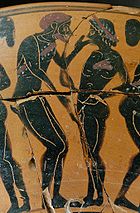
Greek Homosexuality
Encyclopedia

Kenneth Dover
Sir Kenneth James Dover, FRSE, FBA was a distinguished British Classical scholar and academic, who was head of an Oxford college and from 1981 until his retirement in December 2005 was Chancellor of the University of St Andrews....
, published in 1978, it discusses the practices and attitudes of the ancient Greeks
Ancient Greece
Ancient Greece is a civilization belonging to a period of Greek history that lasted from the Archaic period of the 8th to 6th centuries BC to the end of antiquity. Immediately following this period was the beginning of the Early Middle Ages and the Byzantine era. Included in Ancient Greece is the...
toward homosexuality
Homosexuality
Homosexuality is romantic or sexual attraction or behavior between members of the same sex or gender. As a sexual orientation, homosexuality refers to "an enduring pattern of or disposition to experience sexual, affectional, or romantic attractions" primarily or exclusively to people of the same...
, based on archaic and classical archaeological
Archaeology
Archaeology, or archeology , is the study of human society, primarily through the recovery and analysis of the material culture and environmental data that they have left behind, which includes artifacts, architecture, biofacts and cultural landscapes...
and literary
Literature
Literature is the art of written works, and is not bound to published sources...
sources.
It is divided into three major sections, each examining a different group of sources: the iconography of vase paintings, the speeches in the law courts, and the comedies of Aristophanes
Aristophanes
Aristophanes , son of Philippus, of the deme Cydathenaus, was a comic playwright of ancient Athens. Eleven of his forty plays survive virtually complete...
together with smaller sections based on other ancient Greek literary and philosophical writings.
The work has been criticized for restricting itself to Archaic and Classical sources and for reducing an affectionate and pedagogic relationship to a dynamic of power imbalance. Though a landmark study in its time, some aspects are now seen as dated.
Argument

Athens
Athens , is the capital and largest city of Greece. Athens dominates the Attica region and is one of the world's oldest cities, as its recorded history spans around 3,400 years. Classical Athens was a powerful city-state...
— the book claims that the sexual roles of the lovers were sharply polarized.
Dover concludes that the Greeks conceived of same-sex relations primarily as boy love
Pederasty in ancient Greece
Pederasty in ancient Greece was a socially acknowledged relationship between an adult and a younger male usually in his teens. It was characteristic of the Archaic and Classical periods...
and identifies the terms for the roles of the two male lovers, erastes, "the lover," that is, the older active partner, and eromenos, "the beloved", indicating the adolescent male beloved. Basing himself on the work of Sir John Beazley
John Beazley
Sir John Davidson Beazley was an English classical scholar.Born in Glasgow, Scotland, Beazley attended Balliol College, Oxford, where he was a close friend of the poet James Elroy Flecker. After graduating in 1907, Beazley was a student and tutor in Classics at Christ Church, and in 1925 he...
, Dover divides the evidence of surviving vase painting depicting these type of relationships into three types. Some show the erastes offering a gift to the eromenos. Others depict the "up and down" gesture - the erastes attempting to fondle the eromenos while, with the other hand, he is turning his head to look into his eyes. The third group, usually older black-figure vases, show the couple engaging in interfemoral intercourse or, in a couple of instances, anal intercourse. Traditionally, the young beloved, when he reached the age of manhood —indicated in the iconography by his growth of a beard— would switch roles and become a lover himself, seeking out a younger male for a love relationship. Later in life he was expected to marry and produce new citizens for the state.
To fail to switch roles was considered unmanly and irresponsible, and Dover points out the mockery that Aristophanes
Aristophanes
Aristophanes , son of Philippus, of the deme Cydathenaus, was a comic playwright of ancient Athens. Eleven of his forty plays survive virtually complete...
(a very popular and successful Athenian comic playwright) inflicted in passing, in several plays, on a certain Athenian citizen who was notorious for his persistence in the role of beloved long after reaching his maturity.
With regard to the record of cases in the law courts, Dover concentrates primarily on a certain case initiated by the orator Demosthenes
Demosthenes
Demosthenes was a prominent Greek statesman and orator of ancient Athens. His orations constitute a significant expression of contemporary Athenian intellectual prowess and provide an insight into the politics and culture of ancient Greece during the 4th century BC. Demosthenes learned rhetoric by...
. Demosthenes had been in an embassy sent to the neighboring state of Macedonia which had not only failed to achieve its mission, but was widely suspected of having accepted bribes from king Phillip
Philip II of Macedon
Philip II of Macedon "friend" + ἵππος "horse" — transliterated ; 382 – 336 BC), was a king of Macedon from 359 BC until his assassination in 336 BC. He was the father of Alexander the Great and Philip III.-Biography:...
to abandon their mission. Upon the return to Athens, Demosthenes initiated a prosecution of his fellow ambassadors for bribery in an attempt to avoid being indicted himself. The defendants successfully had the charges dismissed on the grounds that that one of Demosthenes' co-plaintiffs, Timarchos, had been a boy prostitute and had thereby lost his rights as an Athenian citizen, becoming ineligible to bring suit in Athenian courts.
Dover extensively quotes from the records of the trial to demonstrate, among other things, that while the Athenians attached no stigma to same sex relations per se, they did adhere to certain conventions; in this case, that no citizen could be permitted to sell his sexual favors, which they regarded as the proper function of a slave, not a free man.

